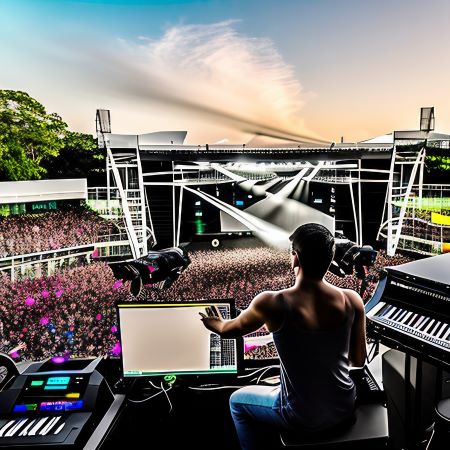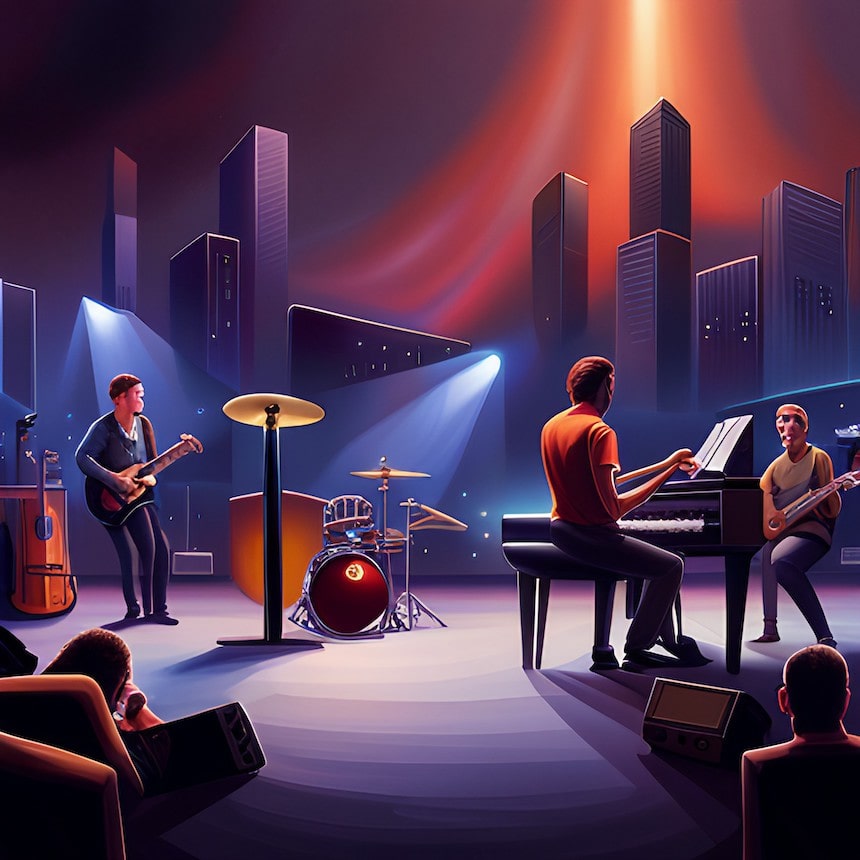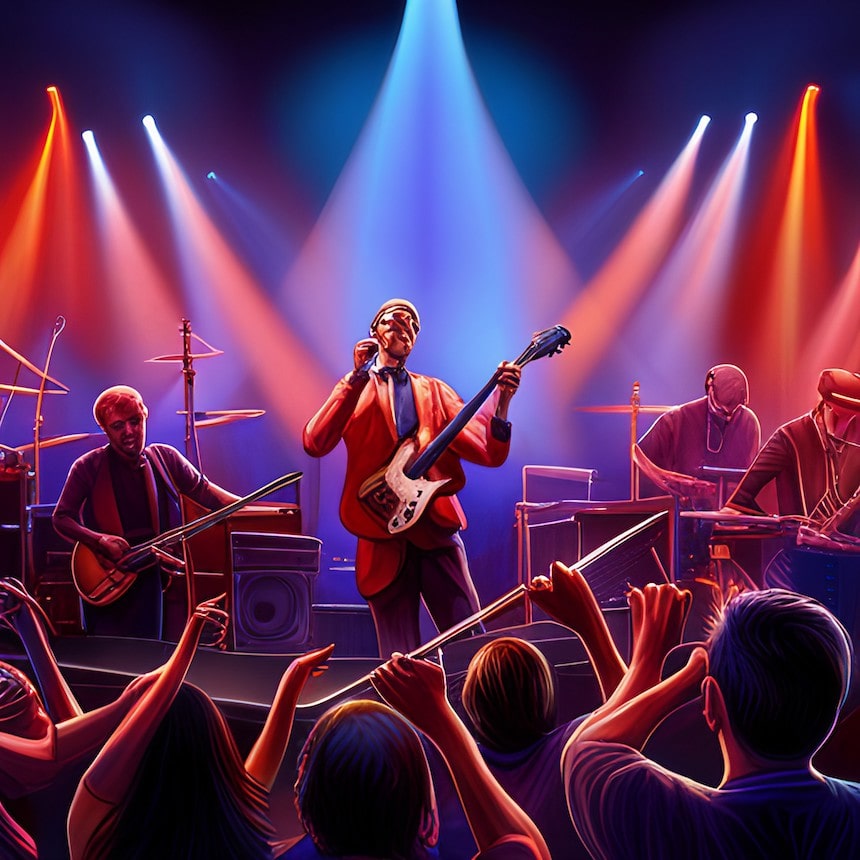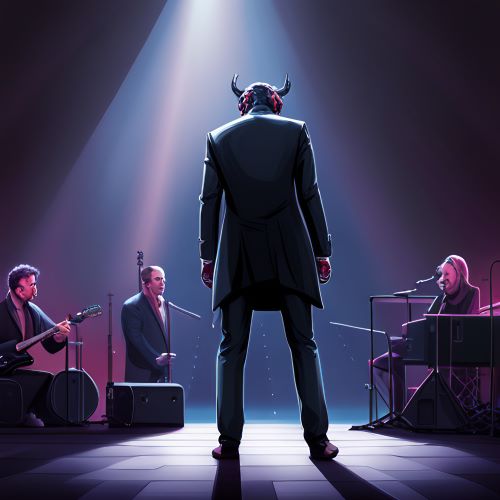Introduction:
 Technology and innovation are transforming our lives in almost every way possible. Artificial Intelligence (AI) is a revolutionary technology that is rapidly changing the way we think, work, and have fun. In recent years, AI has started making inroads in the music industry, changing not only how music is created and distributed but also how it’s experienced in live music concerts.
Technology and innovation are transforming our lives in almost every way possible. Artificial Intelligence (AI) is a revolutionary technology that is rapidly changing the way we think, work, and have fun. In recent years, AI has started making inroads in the music industry, changing not only how music is created and distributed but also how it’s experienced in live music concerts.
The concept of AI-enhanced live music concerts is rapidly gaining momentum in the entertainment industry. Although it’s still in its infancy, AI technology is making a big splash and has already begun to transform how people experience their favorite musicians and bands. With AI, concerts become more interactive and engaging for the audience, creating an unforgettable and unique live music concert experience.
However, AI also poses some challenges and risks for the music industry, such as ethical, legal, and social implications of using and generating AI music. Therefore, musicians and music companies need to be aware of the potential benefits and drawbacks of AI and use it responsibly and transparently.
AI can certainly affect live music concerts and performances, as it can provide new ways of enhancing and interacting with live music. In this blog, we will explore how AI could enhance the live music concert experience and what it means for music fans, artists, and the industry as a whole.
Ways AI Will Impact Live Music Concerts
AI for Sound Engineering
One of the main advantages of AI in music is sound engineering. AI can help sound engineers optimize sound levels to ensure that every note and instrument is audible to the audience. AI can help sound engineers adjust the volume, balance, or effects of different instruments or vocals, or help performers monitor their own sound quality3 .
AI-assisted sound engineering can also help live audio engineers identify and troubleshoot problems, for example, reducing unwanted noise and echo. This will improve the live music experience in concert venues of all sizes. Additionally, AI can help sound engineers create better balance, which is particularly important when sound mixing for large events like music festivals.
AI for Visual Effects
Visuals and effects are an important part of live music concerts. Blending various visual elements can create an immersive and unforgettable concert experience for the audience. AI can help the lighting team deliver the best quality lighting effects that match the current setlist of the performance. AI can help generate live visuals and lighting cues to amplify a performance. For example, AI can help create dynamic projections, animations, or holograms that match the mood, tempo, or style of the music, or help control the color, intensity, or movement of the lights. Moreover, AI can enhance visual effects production, leading to more breathtaking visuals. Through its machine learning ability, machines can learn to create beautiful visuals that would impress the crowd.
AI for Accompaniment
AI can provide intelligent accompaniment that responds to musical changes in real time. For example, AI can help solo musicians play along with a virtual band or orchestra, or help duets or ensembles synchronize their playing during live music concerts.
AI for Audience Engagement
AI can help create interactive or generative content that adapts to the concert audience’s feedback. For example, AI can help create music that changes based on the audience’s applause, gestures, or emotions, or help create games or challenges that involve the audience in the performance.
AI for Crowd Control
A considerable challenge for live music concert organizers is crowd control, especially for the large-scale concerts, where it’s hard to keep track of everyone’s safety. AI technology can help prevent overcrowding and ensure that concert-goers are in designated concert areas. In other large-scale events like music festivals, AI can be used to monitor crowd density and open up more space in crowded areas. AI can provide the promoters with big data insights to give a more comprehensive picture of the event’s safety.
AI for Music Recommendations
Streaming music platforms have already started to use AI algorithms to provide users with personalized recommendations. In the future, AI could also help recommend live music concerts. Using data on users’ musical preferences and past concert attendance, AI can generate a list of recommended concerts so that fans are more likely to attend gigs from artists they love. By using AI recommendations, the artists could benefit from an audience that is already invested in their music and is more likely to engage with their performance.
AI for Music Composition
Lastly, AI is already being used to create music. In the future, AI could be used to compose music for live performances too. AI tools can create unique pieces of music, selecting the best melodies, beats, and harmonies and adjusting them according to user feedback. Musical performances generated by AI technology might not replace live performances by musicians, but it could lead to the creation of new and unique musical performances that change the way music is enjoyed.
Conclusion:
CNN recently reported on a concert in Tokyo featuring Japanese artist Hatsune Miku, an AI-generated hologram of a blue-haired 16-year-old girl. The concert was sold out and featured AI technology such as facial recognition and “interactive” elements that allowed the audience to provide feedback during the performance.
Artificial Intelligence has great potential to revolutionize live music concerts and those experiences in many ways. From sound engineering to crowd control and music composition, AI is rapidly changing the way we experience live music. The use of AI in live music concerts is still at the beginning, but given the numerous benefits AI can bring, it will be exciting to watch as it grows to become a standard within the industry. We should embrace these changes and look forward to a whole new level of musical performance that AI has the potential to offer.
From the rise of AI-generated music, there is potential for live music concerts to be transformed radically. As AI technology continues to evolve, AI-generated music and multimedia performances have the potential to become even more sophisticated and complex. Instead of relying on human curation or the playing of instruments, AI-generated music could be used to create a concert experience that is interactive and tailored to the needs of the audience. AI-generated music could also open up a world of sonic possibilities, allowing musicians to explore and experiment with new sounds and musical ideas. Additionally, AI-generated music could potentially allow for a much more dynamic and engaging concert experience, as AI technology develops further. On the other hand, AI-generated music could also have serious implications for the future of the music industry, with the potential for AI-generated music to replace live musicians. Ultimately, the implications of AI-generated music on the future of concerts are still unclear, and the outcome of this technology on the music industry remains to be seen.
As they say… “The train has left the station” when it comes to the impact of AI on the music industry. Only time will tell if AI is a threat to human musicality, or rather a tool that can enhance it and open new possibilities.
Related Post:
Live Entertainment and 3D Audio: Where Is It Heading?



